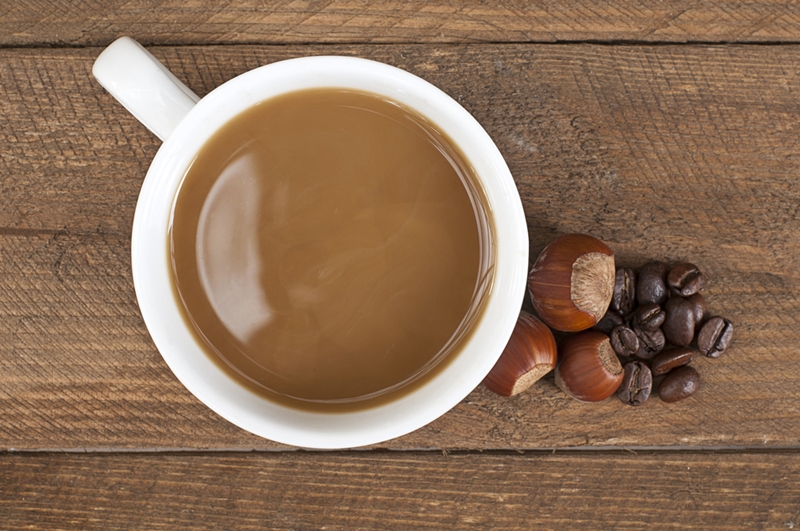
Think twice before you sip that cup of joe. A piping hot brew may be what you need to get going in the morning, but it can be detrimental to your dental health. Dentists have said this for years, and you may have even noticed the consequences in your smile. At this point, the relationship between coffee and poor dental health seems like common knowledge, but have you ever wondered what the underlying causes of this relationship are? Take a look at how coffee may damage your oral health:
"Coffee has an inherent ability to stain your teeth."
Teeth stains
Coffee is dark and acidic, which means it has an inherent ability to stain your teeth. Your enamel, which is the outer layer of your teeth and the hardest part of your body, is comprised of microscopic pits and ridges.1 Food particles can get caught in these pits, and especially dark substances - like coffee - can show through, resulting in extrinsic stains. If not treated, they can cause permanent yellowing.
Beyond being unsightly, coffee stains on your teeth are also difficult to brush away compared to other harsh blemishes. In fact, one study found that regardless of which method you use - bleaching or brushing - teeth with coffee stains have greater restraining potential than those tainted with tobacco smoke.2
Dry mouth
You can thank coffee's caffeine content for giving you that morning boost, but that's not all for which this component is responsible. It can also contribute to dry mouth.3 This condition is marked by a decrease in saliva presence or production and can bring on a number of oral care issues. For example, saliva helps wash away food debris that, if left in the mouth, can rot and cause bad breath. It also contains substances that help fight dental decay and delivers high levels of calcium, phosphate ions and fluoride to strengthen enamel.4 With dry mouth resulting from caffeine intake, your teeth are deprived of this vital tool.
Cavities
Many coffee drinkers add a dash of sugar to the drink. While this added sweetness takes the bite out of bitter brew, it can also lead to tooth decay. Your mouth is already filled with bacteria that lives on the cheeks, gums, teeth and tongue. Some of that bacteria can react with sugar in a harmful way. Essentially, the germs combine with the sweetener to create acid, which can eat away at your enamel.5 The more sugar you consume, the stronger and more frequent these acid attacks become.

Coffee can lead to teeth stains and cavities.
Even with all these cons to coffee drinking, research has highlighted some of this morning drink's benefits for dental health. Brazilian researchers from the The Federal University of Rio de Janeiro exposed already-lost baby teeth to extracts from Coffea canephora - a popular species of coffee. The coffee broke down the bacterial biofilms that cause plaque.6 The substance responsible for this mouth-healthy feature of coffee was the antioxidant polyphenol, which is found in varieties of highly caffeinated coffee.
While this is certainly an advantage to drinking coffee, it does not outweigh the negative side effects of indulging in the brew. When saliva isn't there to protect your teeth and you add sugar into the mix, the real threat of coffee becomes more apparent. As such, it's best to stay away from this popular beverage. However, if that's not possible, drink your coffee in a single sitting rather than throughout the day. Afterwards, rinse your mouth with water or brush your teeth.1
Furthermore, if you're an avid coffee drinker, your biannual dental appointments are all the more important. Use a dental discount card to find a dentist and gain access to discounted dental care.
__________________________________________________________________
1. "How does coffee stain teeth?" Wendy J. Woudstra, Colgate. http://www.colgate.com/en/us/oc/oral-health/cosmetic-dentistry/teeth-whitening/article/sw-281474979067209
2. "The effect of at-home bleaching and toothbrushing on removal of coffee and cigarette smoke stains and color stability of enamel." JZ Bazzi et. al. National Center for Biotechnology Information, U.S. National Library of Medicine. http://www.ncbi.nlm.nih.gov/pubmed/22547725
3. "Dry Mouth," National Institutes of Health, August 2014. http://www.nidcr.nih.gov/oralhealth/Topics/DryMouth/DryMouth.htm
4. "Saliva," American Dental Association. http://www.mouthhealthy.org/en/az-topics/s/saliva
5. "The tooth decay process: How to reverse it and avoid a cavity," National Institutes of Health May, 2013. http://www.nidcr.nih.gov/oralhealth/OralHealthInformation/ChildrensOralHealth/ToothDecayProcess.htm
6. How a cup of black coffee stops your teeth rotting: Certain type of bean has property that can help break down bacteria that causes plaque" Ben Spencer, Daily Mail, June 10, 2014. http://www.dailymail.co.uk/health/article-2654546/How-cup-black-coffee-stops-teeth-rotting-Certain-type-bean-property-help-break-bacteria-causes-plaque.html

